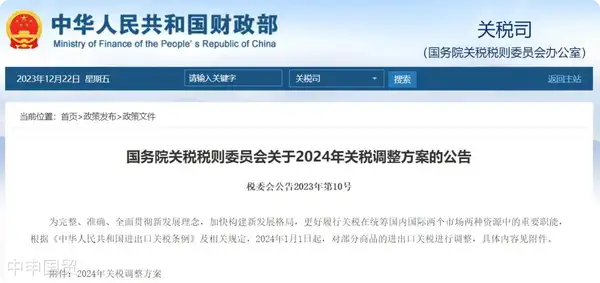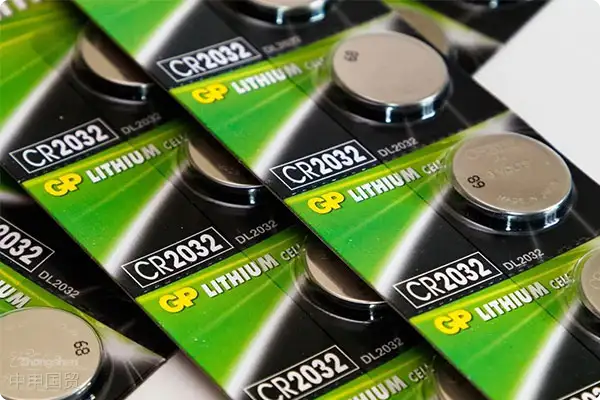- Shanghai Zhongshen International Trade Co., Ltd. - Two decades of trade agency expertise.
- Service Hotline: 139 1787 2118
Starting from January 1, 2024, the Tariff Commission of the State Council of China will adjust the tariffs of some commodities. This is to fully implement the new development concept, accelerate the construction of a new development pattern, and better perform the important function of tariffs in coordinating the two markets and two types of resources at home and abroad. This major legislation, especially the measure of implementing zero tariffs on some anti - cancer drugs and rare - disease drugs, has received widespread attention.import and exportAccording to the 2024 tariff adjustment plan, temporary import tax rates will be applied to 1,010 commodities, slightly lower than the number last year. These temporary import tax rates are usually lower than the most - favored - nation tax rates, aiming to encourage the import of relevant commodities, so as to improve domestic competitiveness, promote technological progress, ensure economic operation, and improve peoples livelihood. For example, infant formula milk powder will continue to enjoy a 5% temporary tax rate, which is significantly lower than the 15% most - favored - nation tax rate.

In order to accelerate the innovative development of advanced manufacturing, China will reduce the import tariffs on resources, key equipment, and components in short supply in China, such as lithium chloride, low - arsenic fluorite, and gas diffusion layers for fuel cells. At the same time, to protect peoples lives and health, zero tariffs will be implemented on some anti - cancer drugs, rare - disease drugs and their raw materials, and the import tariffs on special medical purpose formula foods will be reduced.
In 2024, the import tariffs on sweet corn, coriander, and burdock seeds will also be reduced, and the export tariff on high - purity aluminum will be reduced to promote the development of the new material industry. According to the changes in domestic industrial development and supply - demand situations, the import tariffs on some commodities such as ethylene, propylene, and liquid crystal glass substrates below generation 6 will be increased next year.

In addition, according to the free trade agreements and preferential trade arrangements that have been signed and entered into force with relevant countries or regions, preferential tariff rates will be applied to some imported goods originating from 30 countries or regions under 20 agreements. For example, the free trade agreements between China and New Zealand, Peru, Costa Rica, Switzerland, Iceland, South Korea, Australia, etc. will further reduce tariffs. In addition, the Asia - Pacific Trade Agreement will continue to be implemented.
It is worth noting that the Economic Cooperation Framework Agreement (ECFA) between the Chinese mainland and Taiwan region has completed tariff reduction and will continue to implement the preferential tariff rate. However, for some imported products originating from the Taiwan region, such as propylene and p - xylene, they will no longer enjoy tariff reduction treatment.
Regarding preferential tariff rates, China will continue to grant zero - tariff treatment to 43 least - developed countries that have established diplomatic relations with China and completed the exchange of notes next year, implementing preferential tariff rates, and the scope of applicable commodities and tariff rates will remain unchanged.
In order to promote the better participation of Chinas competitive products in the international market, in 2024, domestic sub - headings will be appropriately adjusted, and tax items such as decorative base paper and high - end steel products will be added. These adjustment measures are conducive to supporting the stabilization of the basic foreign investment, better serving the overall economic and social development; promoting the continuous enhancement of endogenous driving force, better coordinating development and security; promoting high - level opening - up and building a new open - economy system; and promoting industry transformation and upgrading and actively participating in international market competition.
Regulatory Requirements for Exporting Baby and Childrens Products to the EU, the United States, and South Koreaforeign tradeChina Adjusts Import and Export Tariff Policies in 2024 to Support Economic Development and High - level Opening - up_Shanghai Zhongshen International Trade Import and Export Agency Service
Related Recommendations
? 2025. All Rights Reserved. 滬ICP備2023007705號-2  PSB Record: Shanghai No.31011502009912
PSB Record: Shanghai No.31011502009912









